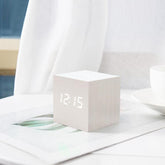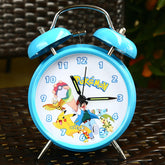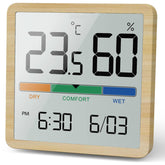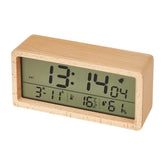Why placing a Wall Clock in a Child's Bedroom?
Putting a clock in your child's room is a harmless gesture for us adults. We are so accustomed to reading the time mechanically that we find no other use for it. But still, putting a clock in his room is a very rich operation.
Are you looking for an idea to keep your child busy and develop qualities he or she doesn't know yet? Do you dream of no longer being woken up by your 3-year-old too early at the weekend? In this article, we reveal 5 good reasons to put a clock in your child's room.
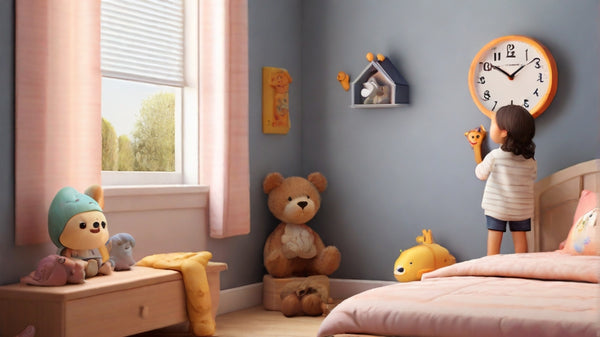
1) Importance of clocks in child's development
Clocks play a crucial role in a child's development by helping them understand the concept of time from an early age. By learning how to read clocks and understand the passage of time, children develop important cognitive skills such as organization, planning, and time management. This understanding also helps children establish routines and schedules, which are essential for their overall well-being and success in school.
Additionally, clocks can be used as effective tools for teaching children about concepts like patience, discipline, and responsibility. By setting timers or using visual aids like analog clocks, parents and educators can help children learn how to wait for things patiently and manage their time effectively. This not only fosters self-discipline but also instills a sense of independence and autonomy in children as they learn to regulate their own activities within a structured framework provided by the clock.
2) Establishing Routine: Helps with daily schedules and tasks
Placing a wall clock in a child's bedroom can revolutionize their daily routine. By having a visual representation of time within their personal space, children can learn the importance of time management from an early age. This simple addition can help them establish a structured daily routine, allowing them to prioritize tasks and activities effectively.
Moreover, the presence of a wall clock can serve as a constant reminder for children to stay on track with their schedules. It encourages independence and responsibility as they learn to manage their own time and complete tasks within set deadlines. In this digital age where screens dominate our lives, introducing analog time-telling devices like wall clocks in children's bedrooms offers a refreshing alternative that fosters essential life skills.
It is also a good idea to place a good alarm clock for kids in their bedroom to teach them routine and get kids excited about waking up.
3) Time Management: Teaches punctuality and responsibility

Placing a wall clock in a child's bedroom is more than just decor - it's a valuable tool in teaching time management skills. By having a visual representation of time, children are able to understand the concept of punctuality and responsibility. This simple addition can help instill important life skills that will benefit them as they grow older.
Encouraging children to be aware of the passage of time through a wall clock can also help them become more independent in their daily routine. They learn to manage their activities efficiently, allocating appropriate time for homework, playtime, and bedtime. This sense of structure can create a sense of accomplishment and boost their self-esteem as they learn to take charge of their own schedule.
4) Anxiety and Comfort: Provides sense of security

Placing a wall clock in a child's bedroom has more benefits than just telling time. For children who struggle with anxiety and fear of the unknown, having a visible clock can provide a sense of security and comfort. It offers them a tangible way to track the passing of time, helping them feel more in control and less overwhelmed by uncertainty.
Furthermore, the rhythmic ticking of the clock can create a soothing ambiance that lulls children to sleep. The consistent sound serves as a gentle reminder of stability and routine, easing their worries and promoting relaxation. By incorporating a wall clock into their bedroom decor, parents can help their children develop healthy coping mechanisms for managing anxiety while also enhancing the overall aesthetic appeal of the space.
5) Learning Tool: Educational opportunity for telling time
Placing a wall clock in a child's bedroom can provide an excellent educational opportunity for learning how to tell time. Not only does it serve a practical purpose of helping children understand the concept of time and manage their schedules, but it also fosters independence and responsibility. By encouraging children to be aware of the passage of time and teaching them how to read the clock, parents can empower them to become more self-reliant.
Moreover, incorporating a wall clock into a child's bedroom decor can add aesthetic value and enhance the overall ambiance. It can serve as a decorative element while also serving as an interactive tool for learning. Children are naturally curious and having access to a tangible visual aid like a wall clock can make the process of learning how to tell time more engaging and fun. Placing importance on this simple yet crucial skill at an early age can set a strong foundation for developing essential time management skills that will benefit them in the long run.
2) Decorate your kid's room with a clock
His room is the place where your child should feel most comfortable. It is in this room that he will spend most of his time (games, nights, etc.). It should therefore resemble as much as possible what he or she wants and the world in which he or she feels comfortable. Children have a lot of imagination! So let him take the lead and guide him so that he feels comfortable in his cocoon.
Offer to install a clock in his room. There are many different kinds of clocks that are wonderful decorative objects. Is your daughter passionate about music and the guitar? Decorate her room with a vinyl clock! If your young boy prefers dinosaurs, put a T-Rex clock in his room. And if his older brother loves airplanes, give him a beautiful clock in the shape of a propeller!
3) Understand the time and find your way in time
From the age of 3, a child is able to understand the time. It won't be on a classic 12-hour clock, indeed. But you can already start to help him or her find his or her way through time in a relatively simple way. Set up a routine clock in his room (it's a 24-hour clock). You can even get him to participate in the creation.
All it takes is a little imagination to turn it into a solid reference point for your child. Define the periods of the night and day: morning, meals, evening before bedtime. Add little drawings, stickers, lots of colours. This will arouse his curiosity and you will be surprised to see that he will refer to it often to find out where he is in his day.
5) To know the history of clocks
It's silly, but it's a very exciting reason. As we saw earlier in the article, your child could end up with a T-Rex clock in his room. Yet clocks are far from being that simple to access and customize. Getting the time, understanding it and reading it has been a very long journey for mankind.
The origin of clocks dates back to Antiquity (around 2000 BC). Since then, they have not stopped developing: from water clocks to hourglasses to the clocks we know today.
The measurement of time and watchmaking are real sciences that have taken millennia to perfect. Before the last connected watch you bought your child on his birthday, there was the wristwatch. This was a truly imposing object and dates back to the 17th century.
So it's very interesting to teach him that. The little designer clock he has in his room doesn't always look like this!
So don't hesitate to put a clock in your child's room. Construction, decoration, history: it is possible to do a lot of things with this simple tool! Your child will be delighted to practice a manual activity or to participate in the decoration of his room. Go for it!





